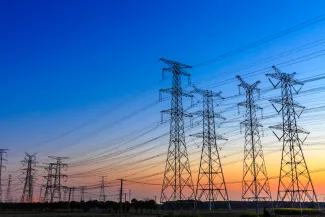
Commentary - Colorado needs good data center policy. This is not it.
Developers of data centers in Colorado already have a 10-year red carpet in the form of reduced costs of electricity paid to investor-owned utilities. HB25-1177, a bill being heard on Wednesday afternoon at the Colorado Capitol proposes to lengthen those incentives to 25 years.
Proponents at the House Energy and Environment Committee surely will have a hard time keeping a straight face while declaring that these carrots will be needed. Does Vail Resorts need to give away free lift tickets on powder days to lure customers?
Big tech companies already are eyeing Colorado. We have relatively low-cost energy. Our largest electrical utility, Xcel Energy, which is responsible for 53% of all sales, wants to invest many billions of dollars in new generating capacity to meet rapidly growing demands. The utility’s models show data centers representing 72% of new growth in peak demand.
Xcel, in a filing on Friday with the Colorado Public Utilities Commission, said it intends to stop offering new “economic development” rates. The reason? The demand is coming with or without a discount on electricity costs, said Jack Ihle, a company vice president.

© zhaojiankang - iStock-802436842
Data centers have become part of our working landscape. Colorado needs to figure out the best public policy, because they can pose enormous demands on both electricity and water.
The largest of data centers are informally called hyperscale. QTS-Aurora, which is near the intersection of I-70 and E-470, certainly qualifies. The data center requires its own 230-kV transmission line from an Xcel substation to deliver 177 megawatts of electricity.
To put this into perspective, Boulder altogether needs 250 megawatts, according to a fact sheet distributed by the Colorado Renewable Energy Society last week to state legislators. The group questions whether the data center could ultimately need 1,000 megawatts of capacity.
If QTS-Aurora received an economic development rate that shaves 3 cents per kilowatt-hour from its costs, it could save $47 million a year, says the renewables group.
Advocates of data centers say they can actually benefit all electrical consumers by driving enormous growth in electrical generating capacity and hence lowering costs. I’m skeptical. It seems far more complicated.
More compelling is the policy adopted by Brighton-based United Power, Colorado’s third largest electrical distribution utility. The electrical cooperative serves members along the rapidly urbanizing and industrializing I-25 and I-76 corridors north and east of Denver. United requires developers of data centers and other major new industries pay their own hardware, design, and engineering costs up front.
Mark Gabriel, the CEO, says eight potential data centers have approached United. He says their projected demand may materialize – or maybe it won’t. Either way, money is not the issue for the data centers.
“The total market capitalization of the top 100 utilities in America is roughly $2.8 trillion,” he points out. “The market capitalization of the ‘magnificent seven’ – Google, Meta and the others – is $13.4 trillion. Money is not the issue. These guys have it. The issue is can they get their data centers in the right locations?”
Gabriel said Xcel and Black Hills Energy, Colorado’s two investor-owned electrical utilities, spread the cost of their infrastructure across all of their customers. As an electrical cooperative, he said, United will not. “The individual companies pay the costs up front. And there is a big difference.”
This year’s data center bill may well die in committee on Wednesday. A similar red-carpet bill last year never even got heard. Tellingly, though, this year’s bill has two prime co-sponsors from Pueblo.
Might data centers help Pueblo? It will lose the tax base of coal plants by 2040. And could data centers help Craig, Hayden, and Brush as the coal plants there close? It’s a complicated discussion. It’s hard to see how this bill would help.
A different question: Could demand from new data centers prevent Colorado from achieving its 2030 goals for reduction of greenhouse gas emissions? Utilities have been reporting supply chain kinks and rising pricing as they prepare to close coal plants. Colorado Springs Utilities has said it doesn’t see how it can meet the 2030 goals. Xcel has also reported delays and rising prices for renewable projects.
Colorado needs to learn from the experience of others. Ireland also embraced data centers – and now has regrets. In Virginia, data centers will keep coal plants running longer. Several states have created guardrails to protect other customers.
We need a deep think. This bill is not that. Alas, several key state legislators who crafted Colorado’s impressive energy pivot in recent years have left the Capitol. It’s not clear who will take their place.
Allen Best chronicles Colorado’s energy and water transitions at Big Pivots.com.















